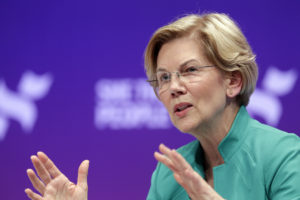Public Banks as the Antithesis of Neoliberalism
Public banks give people the right to share in sustainable abundance—a goal that neoliberalism makes impossible. 16:9clue / CC-BY-2.0
1
2
16:9clue / CC-BY-2.0
1
2
I’m for public banks because people have a right to share in sustainable abundance, such abundance is relatively easy to achieve structurally and democratically, and neoliberalism’s reliance on the private sector to get us there is foolish.

The Copenhagen Declaration was riddled with the contradictions of bourgeois political economy—contradictions that have heightened a lot in the 20 years since the Summit. Although the document argued that economic and environmental insecurity were intimately related, it clung to “economic growth” as a prerequisite to “social justice,” albeit in the context of sustainable development. Classical models of productivity ran through the rhetoric, from lamenting the “ineffectiveness in the functioning of markets” to utilizing the language of “opportunity” – complete with availability of credit as a model solution. “Productive employment and work” was similarly unreflective. The “liberalization of trade and investment” were assumed to be necessary for “sustained economic growth and the creation of employment.”
Today we know that there is plenty of work, but much of it no longer fits (if it ever did) into Fordist models of structural employment. In the developed world in particular, we know that the elites don’t even want everyone to be employed, that artificial scarcity is necessary to justify the continuation of whole categories of financial practices, and that traditional employment is vanishing while working people’s financial obligations are not. However imperfect, the 1995 Declaration contained seeds of hope that, when planted in the soil of a New Economy, could produce far better fruit than the bitter trees of neoliberalism. It insisted that people “are entitled to a healthy and productive life in harmony with the environment.” And it recommended social expenditures for the poor in language that didn’t suggest “workfare” or other exploitative shams.
Vice President Gore’s statement at the Summit, on behalf of the United States, showed much more concern for environmental reform (which Gore has always filtered through the lens of corporate capitalism) than economic reform. Restructuring was necessary for environmental solvency, Gore’s rhetoric seemed to imply, but he framed poverty along very neoliberal lines. His articulation of the foundational poverty question of the Summit was: “What can be done to lift the poorest of our citizens into productive lives?” And he viewed humans, from healthy and productive to sick and uneducated, as “unrealized economic and social potential.” Potential for what? The answer would come in his administration’s NAFTA push, and something even worse. In his statement, Gore said:
We [the Clinton administration] are working now to create a more vital relationship between the government and the people. We cannot succeed if we treat the poor solely as passive recipients of assistance — whether for welfare, food stamps or medical care. We are instead designing an approach that empowers people to be active partners in the management of their own fates. We have to find new links to our own people — with a government that works better and costs less, and focuses on results.
The new “approach” Gore was talking about was the Personal Responsibility and Work Opportunity Act, a devastatingly awful piece of legislation that bought into the twin false narratives of economic scarcity and poverty-as-personal failure and outflanked the Republicans by driving millions of people into material desperation. In a 2012 article, Jason DeParle articulated the devastation:
Your support matters…. . . much as overlooked critics of the restrictions once warned, a program that built its reputation when times were good offered little help when jobs disappeared. Despite the worst economy in decades, the cash welfare rolls have barely budged . . . Even as it turned away the needy, Arizona spent most of its federal welfare dollars on other programs, using permissive rules to plug state budget gaps. The poor people who were dropped from cash assistance here, mostly single mothers, talk with surprising openness about the desperate, and sometimes illegal, ways they make ends meet. They have sold food stamps, sold blood, skipped meals, shoplifted, doubled up with friends, scavenged trash bins for bottles and cans and returned to relationships with violent partners — all with children in tow.
. . . Poor families can turn to other programs, like food stamps or Medicaid, or rely on family and charity. But the absence of a steady source of cash, however modest, can bring new instability to troubled lives.
. . . if the rise in employment was larger than predicted, it was also less transformative than it may have seemed. Researchers found that most families that escaped poverty remained “near poor.” And despite widespread hopes that working mothers might serve as role models, studies found few social or educational benefits for their children. (They measured things like children’s aspirations, self-esteem, grades, drug use and arrests.) Nonmarital births continued to rise. . . . the number of very poor families appears to be growing.
Independent journalism is under threat and overshadowed by heavily funded mainstream media.
You can help level the playing field. Become a member.
Your tax-deductible contribution keeps us digging beneath the headlines to give you thought-provoking, investigative reporting and analysis that unearths what's really happening- without compromise.
Give today to support our courageous, independent journalists.







You need to be a supporter to comment.
There are currently no responses to this article.
Be the first to respond.